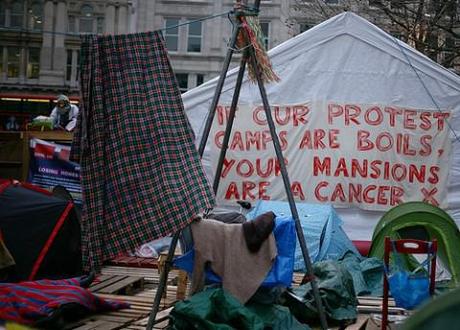
Part of the Occupy London camp at St Paul's Cathedral. Photo credit: Heiko S, http://flic.kr/p/byWYPM
Police and bailiffs moved in to clear the Occupy London camp outside St Paul’s Cathedral in the early hours of Tuesday morning. The eviction was “mostly peaceful”, reported the BBC, with the majority of protesters packing up tents as police arrived. Some, however, formed a temporary barricade and were forcibly removed; there were 20 arrests.
Anti-capitalist protesters have been fighting a legal battle with the City of London Corporation to challenge the eviction. On 22 February the Court of Appeals refused Occupy London permission to appeal against a High Court ruling in favour of the Corporation, paving the way for the camp to be cleared after four and a half months at the site.
So what now for Occupy London (also known as OLSX)? The camp was formed as part of the global Occupy movement for social and economic justice – subjects very much on the current news agenda thanks to a growing backlash against outsized corporate bonuses and the financial crisis in the eurozone. But are the public listening to the protesters?
A view from the camp. Reporting from the camp for The Guardian, James Ball and Ben Quinn wrote that although there was a heavy police presence, “moods were largely relaxed on both sides”. Legal observer Janie Mac told The Guardian that police had been concerned about the eviction, and that “it could have been a lot nastier but thankfully it wasn’t.” According to Ball and Quinn, many protestors believed they were safe from eviction while on the Cathedral steps – but this turned out not to be the case, as police turned up to move them on: “The sweep quickly stirred angry discussions among some at the protest, who quickly concluded authorities at St Paul’s must have allowed the police to clear the steps through an order of trespass.” Occupy protesters are now considering their next move.
Occupy London issued a press release after the eviction insisting that the movement is not over: “We’ll miss Occupy London Stock Exchange but not because of the tents, or even the kitchen shelves: it was a makeshift, loosely cooperative, occasionally quarreling and fiercely idealistic group of people who came together to achieve something extraordinary. The relationships forged during these strange and beautiful four and a half months still have much further to run. This is only the beginning.”
Good riddance. “At best, the Occupy Movement had been a mildly amusing spectacle. At worse, it has managed to once again push a progressive agenda to the political margins,” wrote Dan Hodges on a Telegraph blog. Hodges argued that Occupy London has changed nothing: “Not a single banker has lost a penny of bonus, nor a single corporation a penny of profit, as a result of the Occupy protest.” According to Hodges, the camp was just a “cry for attention”, and those who claim the movement has set the agenda are misguided: “The Occupy protest isn’t driving public opinion. It’s following it. Those camped on the steps of St Paul’s could just as easily have been protesting about the invasion of Iraq, or global warming, or the arms trade, or animal testing.”
Occupy London achievements. “We’ve forced a political debate about inequality – previously one of the great unmentionables. More than that, we’ve opened up a physical and metaphorical space for conversation in a way that hasn’t happened in decades,” wrote Occupy London activists Naomi Colvin and Ronan McNern on The Guardian’s Comment is Free. The point, said Colvin and McNern, is that people have been scared to discuss the economic system – and Occupy has changed that, empowering the public to join the debate. Colvin and McNern said they were optimistic about the future of Occupy, and that the movement already has plans for the future: “It doesn’t matter whether the tents are there or not: no court decision can stop this conversation.”
Problem of indifference. The greatest challenge facing the Occupy London movement is “the indifference of the public”, said Kevin Rawlinson on an Independent blog. Rawlinson argued that part of the problem is that many people don’t understand the leaderless system of Occupy or what exactly the movement stands for: “People familiar with leaderless organisations and activism understand the processes by which Occupy makes its decisions and the values which inform its conduct. It is clear that many people agree that the system of finance and governance of Britain needs to be rethought to one degree or another. But too few currently fit into both groups.” This is a more serious problem for Occupy London than eviction, said Rawlinson.

